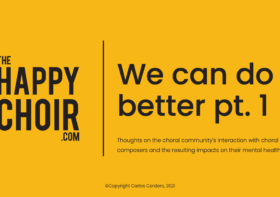Do you enjoy singing this new piece?
Do you enjoy singing this piece? I am always afraid to ask this question. What if someone told me they hate my piece? What if they say my piece is the worst piece ever composed in choral music? Yes, the mind of an artist can be very creative when self-doubt and fears are the voice talking in your head.
That could happen. I’ll rephrase that:
Something like this will happen.
It will because people have different preferences. What you love and enjoy, others might hate and despite. So if you ever hear something like this in your career, it would be ok. You would survive. You would probably hurt, but you’d survive.
It is still terrifying though. Writing music can be such a subjective act. We are inherently biased to our pieces. There are times that I wonder if there is someone who does not enjoy my piece as much as I do, and why? Even when we bring others into the equation, we still make decisions based on our likes and dislikes.
If you are a conductor, you might have the same feelings about your programming. So, how do we avoid being hurt by such comments?
Ask better questions
The reason why I ask this question is so I can learn other people’s views. So I can grow, and look further than my own mind. But I also know that there are better questions out there that I can ask. When I ask people “Do you like singing my piece?” I am asking for their approval. I am putting them on the spot, and nobody likes that. They would probably lie just to save themselves from an awkward situation.
Some better questions to ask would include
- What do you enjoy about this piece?
- What do you think could be better?
- What do you think when you perform this piece?
- Is it comfortable to sing?
- Do you connect with this piece?
These are not the definitive list of better questions, but they are a good start. You could even ask why do you enjoy singing this piece (or why don’t you) and that would be far better.
It would at least include some details.
Don’t Ask At All
It might sound childish, but it does help. If you resist the temptation of asking, you will not have to work through the feelings. I am not saying that you should escape the truth. I am saying that it is not mandatory to ask. It is even more important to know when to ask and to whom. So don’t go out there asking everybody for feedback on your piece. Instead, take your time and decide when the timing is right to do so.
Don’t put all your happiness in other people’s responses
This is a tough one. I struggle with that every day, but it is important to learn to find happiness within ourselves. No matter what answer we get from the external world, if we feel happy and confident about our art, then it will all be ok. We will be able to receive criticism and try to implement what we feel is best.
We will be able to do this because, in reality, it is all about honesty. When we are confident about our work, we are able to not get upset and listen to the comments with a fresh mind. One that allows us to discern what is good for our piece and what is just noise.
When we are honest with ourselves, we are able to past our own biases and judgments, and do what is best for our art. We get to the core of why people enjoy singing your piece and why not.
Have you asked this frightening question? Have you been asked? Tell me in the comments. I would love to hear your own story.



